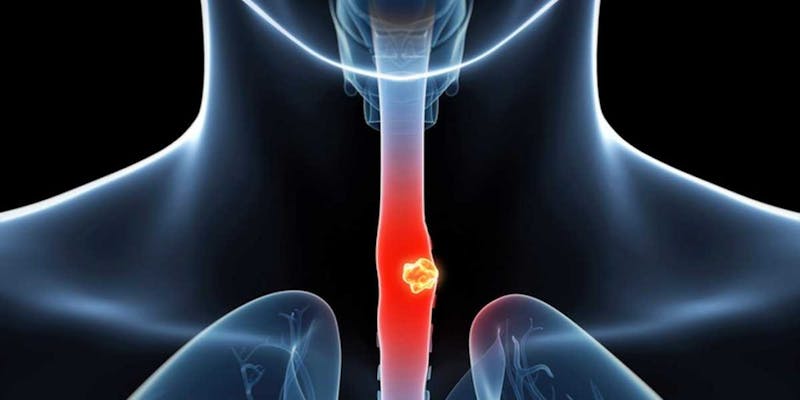
Esophageal cancer occurs when cancer cells develop in the esophagus, a tube-like structure that runs from your throat to your stomach. Food goes from the mouth to the stomach through the esophagus. The cancer starts at the inner layer of the esophagus and can spread throughout the other layers of the esophagus and to other parts of the body (metastasis). There are two main types of esophageal cancer. One type is squamous cell carcinoma. Squamous cells line the inner esophagus, and cancer developing from squamous cells can occur along the entire esophagus. The other type is called Adenocarcinoma. This cancer develops from gland cells. To develop adenocarcinoma of the esophagus, squamous cells that normally line the esophagus are replaced by gland cells. This typically occurs in the lower esophagus near the stomach and is believed to be largely related to acid exposure to the lower esophagus.
What Are the Symptoms of Esophageal Cancer?
Early on there may be no symptoms. In more advanced cancers, symptoms of esophageal cancer include:
- Difficulty or pain when swallowing
- Weight loss
- Pain in the chest, behind the breastbone
- Coughing
- Hoarseness
- Indigestion and heartburn
What Are Risk Factors for Esophageal Cancer?
There are a number of factors, which increase a person’s risk of developing esophageal cancer. They include: Gastro esophageal reflux disease (GERD), in which contents and acid from the stomach back up into the esophagus, significantly increase the risk of adenocarcinoma of the esophagus. It is estimated that about 30% of esophageal cancers are related to GERD.
Smoking or other use of tobacco. Heavy alcohol use. Barrett’s esophagus, a condition that affects the lower part of the esophagus and can lead to esophageal cancer. Barrett’s esophagus may be caused by GERD. Over time, stomach acid in the esophagus can cause changes in the cells that increase risk for adenocarcinoma.
How Is Esophageal Cancer Diagnosed?
To diagnose esophageal cancer, your doctor will review your symptoms, medical history, and examine you. In addition, he or she may order certain blood tests and X-rays.
Barium X-ray, in which you drink a liquid that coats your esophagus. This makes the esophagus stand out on the X-ray so that your doctor can identify certain problems.
Endoscopy: the doctor passes an endoscope, a thin, lighted tube, down your throat into your esophagus to examine it. Endoscopic ultrasound uses sound waves to provide more information about the extent of tumor involvement in nearby tissues.
Biopsy: During an endoscopy, the doctor can take cells or tissue from your esophagus. The cells are examined under a microscope for the presence of cancer.
Other tests, including computed tomography (CT) scans, positron emission tomography (PET) scan, thoracoscopy, and laparaoscopy, may be performed to determine if the cancer has spread, or metastasized, outside of the esophagus. This process is called “staging.” The doctor needs this information in order to plan your treatment.
How Is Esophageal Cancer Treated?
As with many cancers, esophageal cancer treatment has a greater chance of success if the cancer is caught early. Unfortunately, by the time esophageal cancer is diagnosed for many people, it is often already in an advanced stage (has spread throughout the esophagus and beyond).
Treatment of esophageal cancer depends on many factors, including the stage of the cancer and the overall health of the patient.
Surgery: Part or the entire esophagus may be removed.
Radiation therapy: Kills cancer cells with radiation.
Chemotherapy: Powerful drugs that target cancer cells throughout the body. Typically used in combination with radiation therapy and/or surgery.
Photodynamic therapy: Targets early cancer cells with a special laser light. Electrocoagulation: Uses electric current to destroy early cancer cells.
Endoscopic mucosal resection may be done to treat precancers or very small early cancers by removing the inner lining of the esophagus. Radiofrequency ablation treatment using a device that targets cancer cells with radiofrequency energy is sometimes used for early cancers.
How Are the Stages of Esophageal Cancer Treated?
Treatment options for esophageal cancer by stage involve the following:
Stage 0: Usually surgery. Other options include photodynamic therapy, radiofrequency ablation, or endoscopic mucosal resection.
Stage I, II, and III: Surgery, clinical trials of chemotherapy and radiation, or clinical trials of new therapies.
Stage IV: Chemotherapy, radiation, laser therapy, electrocoagulation therapy, or clinical trials. Treatment for this stage focuses on “palliative” therapy. Palliative therapy is meant to relieve the pain and difficulty swallowing caused by cancer, and is often given to patients who are in an advanced stage of cancer, or who are near the end of their lives.
According to the American Cancer Society, the percentages of people who live for at least five years after being diagnosed with esophageal cancer (taking into account that some people with esophageal cancer will have other causes of death) is 38% for localized cancer to the esophagus, 20% for cancer that has spread regionally, and 3% with distant cancer spread.

